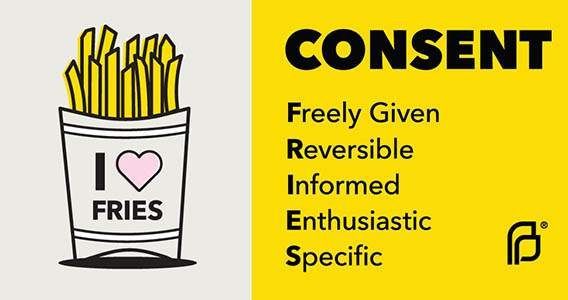2. Non-Exploitation
Sex should never involve any kind of nonconsensual physical force or emotional pressure, guilt, manipulation, or taking advantage of someone’s trust or vulnerability– either subtle or overt. Exploitation is anywhere full consent is absent– individually and systemically. In addition to the
nevers already mentioned, this includes exploiting trust by breaking agreements, having affairs, lying, withholding relevant information, and consuming exploitative sexual content or pursuing exploited sexual labor*. Real intimacy grows from respect, trust, and choice, not fear, obligation, or control. When everyone feels safe to express what they want—and don’t want—sexuality becomes a space of freedom and authentic desire, not fear.
*Trustworthy markers of ethical pornography production as well as consensual sex work include evidence of all 6 sexual health principles. This may include consent, performer safety and well-being, fair labor and compensation (yes, pay for your porn), diversity and representation, transparency, respect, performer agency and autonomy, and more. Ethical porn prioritizes people over profit and pleasure with performance, and sex work is consensual, chosen work, distinct from exploitation/trafficking.
3. Honesty
Honesty starts with self-awareness:
What do I want? What feels right for me? What does sex mean for me?
What are my sexual values?
In partnered sex, it’s paired with other-awareness:
What do they want? What is relevant for them to know about me? What is relevant for me to know about them? Is this a safe enough dynamic to share vulnerable pieces of myself? Am I a safe person for their vulnerability?
If it’s not a safe enough dynamic to share your intimate desires, that’s good information. To cultivate an authentic and expansive sexual relationship– solo or partnered, casual or long-term– we’re tasked with owning our desires, relevant history, agreements, and risks. If it’s not safe to be vulnerable, a key element of sexual health is missing. Honest dynamics, consent, and non-exploitation intersect to create a robust foundation for sexual pleasure, intimacy, empowered identity, health and wellness.
It’s in this domain that the “body-count” question tends to come up. Before you ask your partner, I want you to ask yourself what you actually want to know.
What would any given number mean to you? What really matters?
More often than not, when we ask about body count, we’re actually looking for:
- Values congruence
- Sexual health risks
- Emotional risks
- Testing openness or honesty
- Reassurance that we matter or that we’re going to measure up
When you get clear on what you actually want to know, is it really the number? Could that question actually be a barrier to genuine connection? What else could you ask or share to inspire a meaningful dialogue? Here are some options:
To invite a conversation about values congruence:
- What does sex mean to you in a relationship?
- What helps sex feel meaningful or connected for you?
- How do you usually decide when you want to be sexual with someone?
- What role does emotional connection play in sex for you?
- How do you feel about monogamy, openness, or exploring with a partner?
- How do you feel about casual sex?
- What feels like integrity to you when it comes to sexual relationships?
To invite a conversation about sexual health:
- Do you have a regular testing routine or preference for safer sex practices?
- What kinds of safer sex methods feel best for you — condoms, barriers, testing together?
- Would you want to get tested together?
To invite a conversation about emotional risks:
- How do you like to build trust before getting physical?
- What kind of connection are you looking for right now?
To invite a conversation about openness or honesty:
- Is it easy or hard for you to talk about sex and desire?
- What kind of transparency feels important to you about past experiences?
- What does honesty look like to you when it comes to sex?
To invite reassurance:
- Sometimes I get in my head wondering if I measure up — could you tell me what feels special about us?
- Sometimes I end up comparing myself, but I’d rather ask directly — what feels different or meaningful about what we have?
- Can I be honest? I think I’m needing a little reassurance that I matter to you.
- I know this might sound vulnerable, but what makes you choose me — not just physically, but emotionally?
- What do you notice in me that feels different from your past connections?
- I really like being close to you. Do you feel that way too?
- I notice I get a little insecure sometimes — could I ask for some reassurance when that happens?
- Can I tell you what I love most about being with you — and then you tell me what you love about me?
I invite you to retire the historically loaded body-count question in favor of more authentically and vulnerably asking about, expressing, and discussing the domains that question tends to represent. It’s more honest that way, and while compassionate honesty isn’t always easy, it’s always liberating, which brings us to…
4. Shared Values
All cultures– micro (just you and your partner) and macro (the broader context in which you live)– have varying standards around when, how, under what circumstances, and what kind of sexual expression is considered ok.
Healthy sex isn’t just about chemistry — it’s about alignment with your personal values, respect for the autonomy of others, and shared meaning. Whether that’s monogamy or CNM, casual sex, emotional connection, exploration, timing, meaning, simply accepting different preferences or tastes, every person and relationship has a right to define what sex and intimacy mean to them. Shared values and understanding cultivate fairness, safety, and security.
And, if you discover you’re out of alignment with your partner, wonderful! I know that’s weird to say, but bear with me. It’s arguably better to know sooner rather than later, and you have options.
1. There’s a saying in the sex therapy community, which is that we don’t Yuck someone else’s grown up, consensual Yum. We don’t have to like it. We definitely don’t have to participate in it. We are simply tasked with checking our negativity at the door.*
2. You can further explore, getting to know one another with curiosity and understanding, and negotiate your dynamics perhaps using the
Gottman’s Dreams Within exercise, the
Art of Compromise, and/or
Midori’s steps for erotic negotiation.
3. Or, you can thank them for telling you and respectfully, compassionately discuss a de-escalation of the relationship expectations to free each of you up to pursue dynamics that are more aligned with authentic needs, wants, and wishes. If there really is a full deal breaker, while it stings, it’s generally better to know sooner rather than later. Relationships have enough unknown landmines that sneak up on people. We don’t need to plant even more.
*I’m compelled to plug here that if your yum is one that is inherently exploitative, it is
imperative that you seek specialized support.
5. Protection & Prevention
6. Pleasure
And, last on this list because it sits on a foundation of all the other principles, pleasure is central to not just sexual health, but overall health. It isn’t optional—it’s essential. Sex educator and author
Emily Nagoski says it best:
“Pleasure is the measure.”
It’s not about performance, perfection, or even orgasm; it’s about connection, presence, and play. The measure of good sex is fundamentally the right to experience pleasure, which is an ethical good in itself, affirming sexuality as a life-enhancing force. Pleasure is the thing in life that motivates, inspires, and fulfills. And, if erotic touch isn’t pleasurable for you in any way, fashion, or form, that’s ok too! Pleasure can also be cuddling, self-touch, dancing, laughing, playing cards, reading a book, reclining on the couch with your favorite ice cream, watching Netflix, or any number of other things. You determine what feels good and fulfilling. When pleasure is mindful and shame-free, it becomes a source of individual and relational vitality and well-being. What that pleasure looks and feels like, however, can be as unique as a fingerprint.
The Nitty Gritty
Sexual health and sex positivity aren’t just about avoiding harm. It’s about connection, honesty, and joy, and when we bring curiosity instead of shame, respect instead of fear, and autonomy instead of obligation, sex becomes what it was always meant to be: a source of vitality, intimacy, and expansion into authenticity and fulfillment.
Ready to explore your own sexual well-being?
Reach out!
For clinicians and helping professionals.
If this topic resonates with your clinical work, I offer continuing education and professional consultation focused on ethical, sex-positive, relational care. You’re welcome to explore courses or reach out to learn more.









